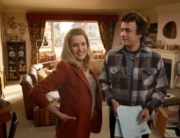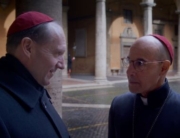Stalked by the forces of evil, an iconic yet raffish guitar player gambles with his life, fleeing Nazi-occupied France. Sounds like an exciting premise, n’est-ce pas? But director Étienne Comar’s biopic of Django Reinhardt, the Manouche Romany who defined the captivating signature “jazz hot” style, bogs down a potentially electric story with a stifling, low-energy approach.
Let’s start with the camerawork and lighting: stately, gliding midrange shots in a palette of beige, cream, and gold. Then on to the dialogue: long deliberations between Reinhardt and his family over whether to run from the Nazis, carried out with no particular urgency. Then to the music: a seven-minute jazz band session that sounds straight off of Spotify, without the zing and daring of a live jam. And then finally to the lead performance, a somber turn from Reda Kateb that falls short of the life force you might expect of a bohemian, a risk-taker, and a brilliant artist who defied musical and political categorization—all while playing lightning guitar despite having had two fingers amputated to boot.
With a few exceptional bursts of Nazi violence, scenes play out at a uniformly decorous pace, coming and going without strong connections to each other. Cécile de France makes the best of an odd part as Louise de Klerk, Reinhardt’s lover and the only person seemingly alert to the full extent of the Nazi threat to him and his family. She’s also a double-dealing Nazi handmaiden, which should say something about divided loyalties in wartime. Like other larger statements in the film, the idea doesn’t register with much force.
Reinhardt feels that the approaching disaster has nothing to do with him, and it takes a long time for him, as a Romany, to figure out that, indeed, it does. “You’re the only person whom the war hasn’t changed,” Louise blurts in a moment of irritation, and the movie seems to take a while to make up its mind, too. It’s set during wartime without the real feeling of a war and its accompanying peril and tragedy.
Louise parlays the Nazis into offering Reinhardt a gig by the Swiss border, an offer he accepts after some prefatory objections. The lovers want the concert to distract the Nazis so others can escape, after which Django will make his own break for freedom. This far-fetched plot point plays out with not quite enough suspense, although rowdy music and dancing goose the pace somewhat. Reinhardt’s final evasion of the Nazis not only seems unrealistic but easy as pie, a fitting end to a film that opts for low key while the most terrifying conflagration in history rages on around it.







Leave A Comment